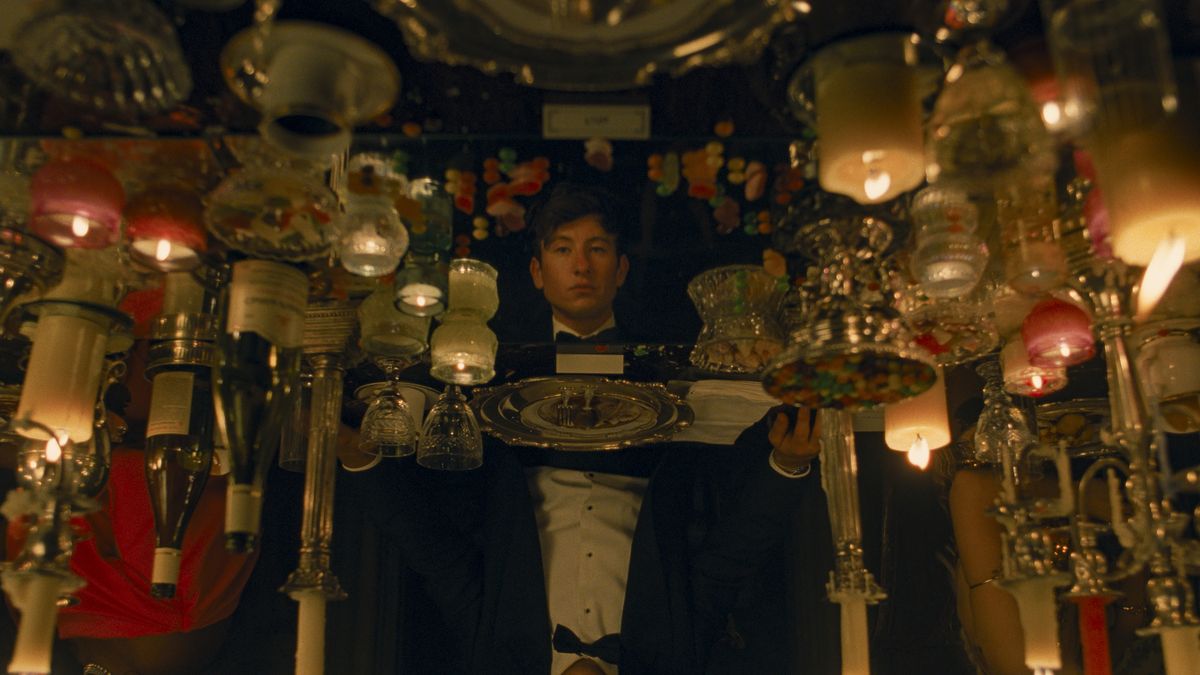You know what the problem with Brideshead Revisited was? Too much Catholicism, not enough gak or wanking in the bath. In her spirited (euphemism for: batshit) sort-of update to Waugh’s English country house classic, the British writer-director Emerald Fennell chucks everything at the screen to see what sticks.
Like its predecessor, Fennell’s debut Promising Young Woman, a rape-revenge black comedy that won her an Oscar for best original screenplay, Saltburn revels in its own provocations and transgressions. It’s Brideshead meets The Talented Mr Ripley meets Tales of the Unexpected. It’s a comedy of manners, a social satire, a riotous farce, a twisted romance and a histrionic melodrama, all in two wildly uneven hours. There’s full-frontal nudity, there are montages, and voiceovers, and there’s a framing device. There are some Class A performances and there’s a plot that loses itself as completely as a rave casualty. This is filmmaking that’s swigging from the Champagne bottle. The result is a bit of a mess, but you can’t fault the energy or the ambition.
Barry Keoghan, the gifted Irish actor who is putting together quite the gallery of creeps, plays Oliver Quick, the Charles Ryder / Tom Ripley character, an unpolished outsider drawn into the orbit of a hedonistic upper crust family, the Cattons, inhabitants of the titular stately home. (Saltburn is played by Drayton House in Northamptonshire. It’s suspiciously kempt, based on my — limited, but not entirely — experience of hanging out with English aristos in their leaky piles.)
We meet Oliver as a fresher at Oxford, where he finds himself excluded from the cloistered inner sanctums of privilege and entitlement — until an apparently chance encounter with the most doree of the jeunesse doree, the beautiful, charismatic Felix Catton (Sebastian Flyte / Dickie Greenleaf), played by the Euphoria starlet Jacob Elordi.
What Oliver sees in Felix is obvious — it’s not far off what everyone sees in Felix: meal-ticket–slash-fuck-buddy — but what Felix sees in Oliver (in fact what anyone sees in Oliver) is never made clear. He’s socially awkward, physically hangdog, unprepossessing in every way. He’s a “bootlicker”, as one character has it. Even — the only truly cardinal sin among the upper classes — a bore.
Conveniently, our tale unfolds in 2006, pre-smartphone, pre-social media, pre-smoking ban (bliss was it in that dawn… etc), but apart from the occasional clue — everyone’s reading Harry Potter and listening to MGMT (“Time to Pretend”: there’s another clue right there) — it might as well be 1986 or 1936: the toffs are on top, the rest of us can only look on in envy and resentment.
Fairly quickly, Oliver is revealed as heartlessly Machiavellian. But Felix ignores the signs, or simply doesn’t care, preferring to see his new friend as a fixer-upper, a fun summer project. The glamorous young man is a collector, we later learn, of waifs and strays. So it’s off to jolly old Saltburn for sunny hi-jinks. That’s Felix’s plan, anyway.
Keoghan is good as ever, in his weird way, and he gets a memorable final scene. Elordi, the most basically gorgeous thing to come out of Australia since Margot Robbie (a Saltburn producer), does an excellent posh drawl, and Fennell’s camera lingers over him longingly, though his character rather fades into the wallpaper as the narrative progresses. Alison Oliver is well cast as Felix’s nympho sister, Venetia. Archie Madekwe plays a slightly implausible cousin (the film’s take on Anthony Blanche / Freddie Miles), a waspish gay African-American, alive to Oliver’s scheming in a way the others are not. (What’s he doing hanging out with these waxworks?) Richard E Grant makes his usual fine fist of the barely-there lord of the manor, particularly impressive as the tone darkens and previously louche upper lips stiffen. And Carey Mulligan, the star of Promising Young Woman, gets a delicious cameo as a house guest who has overstayed her welcome. The character is listed in the credits as “Poor Dear Pamela”, which gives a flavour.
And then there’s Rosamund Pike, who doesn’t so much steal her scenes as ramraid the screen and make off with the entire film in her boot. She plays Felix’s mother, Elspeth Catton, and hers must surely be the most purely enjoyable performance I’ve seen in any film this year. With her haughty, high-cheekboned beauty and her cut-glass vowels, Pike is often cast as frigid ice queens. Here she gets to let rip. Her Elspeth is perfect. You get the sense that both Fennell, who wrote her, and Pike, who inhabits her, know this woman to her bones. She’s regal and cruel, socially entirely confident in her tastes and manners, but intellectually and emotionally insecure, so her credulity can be exploited, eyes widening in uncertainty, pleading for connection. She also gets all the film’s best zingers.
“I was a lesbian for a while, you know,” she tells Oliver, in Saltburn’s standout scene. “But it was all just a bit too wet for me.”
Appropriately, Saltburn is proof, as its loaded characters might confirm, that sometimes you really can have too much of a good thing. The Highsmithian elements — the schematic plot, the kinky sex — don’t quite coalesce. Highsmith’s perversions were not a pose; here, the deviance feels a bit put on, like a fancy-dress costume.
Brideshead, too, is a good time, at first. Waugh was no stranger to the Naughty Salt — he was a Bright Young Thing — nor to unrequited, and requited, passions between young men. He knew all about gak and wanking. But the yearning in his novel — for a place to belong, for physical and emotional love, for meaning, even for divine grace — is real, and deep (if a bit cloying). I’m not sure you could say the same about Fennell’s film. Although she does, perhaps, share Waugh’s partiality for the old order against the danger of invasion from the unwashed non-U. In that way, perhaps, hers is as socially conservative a work as his. Fun, though.
Saltburn is in cinemas now















